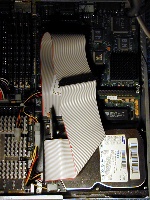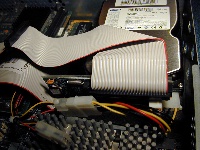

However, even 4GB isn't enough if one is doing such tasks as video work, CD burning, imaging, etc., ie. any task which needs alot of disk space. Buying a SCSI disk from somewhere is the usual option, eg. some kind of 9GB or 18GB from Ebay, or even buying a new disk. Today, 18GB SCSI disks are reasonably priced and easy to obtain, eg. 70 UKP for an 18GB SCA disk from Scan Computers (UK). However, an alternative is to use an IDE/SCSI adapter that allows one to use an IDE disk, connected to the SGI system's SCSI bus.
IDE disks are not as fast or reliable as SCSI disks (mean time to failure for IDE is worse than SCSI; the latter is better quality), but they're much cheaper in terms of cost-per-MB of space (mass production effects, etc.) Thus, even though one may have a SCSI system disk, eg. a 9GB 10k rpm SCA in an Octane, using something like a 200GB IDE disk in conjunction with an adapter just to give alot of basic storage may be a good alternative. It should also work just fine even as a system disk, though what the implications are for performance I don't know (probably none if one is using an older system such as Indy or Indigo2 since the SCSI bus itself is rather old); personally, if I decided not to use an IDE disk + adapter as a system disk it would be because of reliability issues.
The IDE+adapter idea certainly works fine in Indy, which means it should also work ok in any Indigo or Indigo2. More interesting would be to see how effective it is in Octane/Origin.
Thus, here is some detailed information on an example setup from "Alexander_Oberdrster" <oberdoer@uni-duesseldorf.de>, who uses a large IDE disk as a system disk successfully in his Indy.
Alexander told me:
Well, in fact it was straightforward. IDE drive + adapter = SCSI drive. No problems at all. The adapter is an ACARD AEC-7720U. I got the adapter from Com-Discount in Germany for about 75 Euros, but buying it in other countries should be no problem either, as ACARD has a list of dealers and distributors on their website. I set termination and SCSI ID on the adapter, set termination power to off (as the Indy already provides TERMPWR), plugged the adapter into my IDE drive (SAMSUNG SV8004H), plugged the SCSI cable into the ACARD and connected power to both adapter and drive. The adapter is powered by a small power connector (also used for 3,5" disk drives). I'm not sure if the proper Y cable was provided. Maybe I just had one lying around. The IDE drive with adapter works just like a regular SCSI drive. I just partitioned it with fx, copied the contents of my old SCSI stripe set over with xfsdump/xfsrestore and rebooted. The Indy can access the whole capacity of ~75 GB. According to a simple speed test (linear copy of a single file to /dev/null), the read transfer rate is about 7 MB/s, which should be about the maximum the Indy's SCSI interface can handle. Unfortunately, the drive with adapter doesn't fit into a drive sled. The AEC-7720U board is plugged directly into the back of the IDE drive, without any intermediate cables and is mounted perpendicular to the PCB of the drive, so it protrudes a few centimeters above and to the left of the drive. I just removed the drive sleds and put the whole setup on a block of foam. Maybe I'll mount it properly someday, but I don't want to drill any holes into the case of my Indy. Because of this fragile setup, I would rather recommend the ARS-2000FU (also from ACARD). It can be neatly screwed to the bottom of the drive. Com-Discount sells it for about 85 Euros. A similar adapter was availabe at the time I bought mine, but it was prohibitively expensive then. Most drives will be still be to thick to fit in the drive sled with the ARS-2000FU screwed underneath, though. ACARD AEC-7720U ACARD ARS-2000FU Com-Discount SCSI-IDE-Adapters I included two pictures of the setup. I didn't want to take it apart for further shots -- that would mean downtime :)


These adapters allow for some interesting possibilities, eg. a QLOGIC U160 in Octane, with multiple large IDE disks attached to the bus using adapters, giving nearly 2TBytes of storage for much less than the cost of a normal RAID or JBOD setup. Aside from such extreme examples though (and performance/reliability/failure issues not withstanding), just having plenty of space for dealing with video (and other tasks) is good enough reason to consider using an IDE/SCSI Adapter.
The UK distributor for the AEC7720U adapter (20MB/sec) is PC500.net. They currently sell the module for 40 UKP (approx. $64). The UW version (40MB/sec) is just under 48 UKP (ideal for the system busses of O2/Octane/etc.), the U2W LVD version (80MB/sec) is just under 85 UKP and the U160 LVD version (160MB/sec) is just under 79 UKP. Note that the U160 model is cheaper, probably because they sell more of them than the U2W version.
My thanks to Alexander for supplying the original information.
Comments and feedback most welcome!